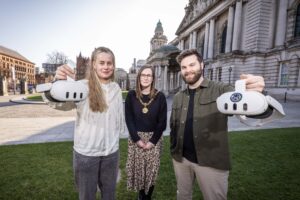Government funding announced for projects driving breakthroughs in brain scanners, navigation systems and quantum computing
We’re about to experience a revolution in healthcare and transport say the enthusiasts for quantum computing. The government are caught up in the buzz, with quantum one of the five critical technologies in the UK Science and Technology Framework.
The hope is that quantum will outstrip the capabilities of our current, ‘classical’ computers. Everything from your smartphone to your laptop is built on that classical model, which encodes information in ‘bits’ – that is, 1s and 0s.
Quantum computing is based instead on quantum bits or ‘qubits’, which can represent different things at the same time. The physics is complex but basically: quantum has the potential to do much more complex computing many, many times faster than is possible now. That means the ability to tackle problems beyond the capacity of current computers.
The UK is leading cutting-edge development of technologies with the aim of exploiting quantum computing. These include brain scanner using quantum to improve diagnosis of disorders such as epilepsy and dementia, and a smart navigation system for trains that uses quantum sensors to enhance safety in tunnels.
Of the £45m total, £30m is being invested by the UKRI Technology Missions Fund and the UK’s National Quantum Computing Centre (NQCC) in a ‘Quantum Computing Testbeds competition’ to drive forward projects based on diverse hardware architectures by March 2025.
Projects receiving funding through the NQCC testbeds competition are:
- Asteroidea (a flexible photonic quantum computing testbed for machine learning), led by ORCA Computing in London
- QUARTET (QUantum Advantage-Ready Trapped-Ion Exploration Testbed), led by Oxford Ionics
- SQALE (Scalable Quantum Atomic Lattice computing testbed), led by Cold Quanta UK in Warwick
- Towards an error-corrected neutral-atom quantum computer, led by QuEra UK Ltd in Exeter
- Full-stack superconducting 24-Qubit quantum computing testbed with tuneable couplers and scalable control system, led by Rigetti UK in London
- ARTEMIS (Advanced Research Testbed Manipulating PhotonIc States), led by Aegiq in Sheffield
- Silicon Cloverleaf, led by Quantum Motion in London
In addition, the £15m Quantum Catalyst Fund aims to fast-track the integration of quantum solutions in the public sector. Projects supported by this fund are:
- Quantum Simulations: A New Era for Actinide Chemistry, led by Cambridge Quantinuum in London
- Railway Quantum Inertial Navigation System for Condition Based Monitoring, led by MoniRail in the West Midlands
- Quantum-Enabled Brain Imaging: A Pathway to Clinical Utility, led by Cerca Magnetics in Nottingham
- GCC (Gravity Cartography Catalyst), led by Delta g in Birmingham
- Quantum optimised train schedules, led by Q-CTRL UK in London
- Quantum computing solutions for optimisation problems in energy grids, led by Phasecraft in London
Science Minister Andrew Griffith says: ‘As we steer towards an economy benefitting from quantum, this further £45m in funding underscores our commitment to support bright UK innovators who are pushing boundaries and seizing the potential of this technology to transform our public services.
‘Cutting-edge work on a quantum enabled brain scanner, which will be a beacon of hope for those battling neurological conditions, is just one example.
‘The UK is already one global leader in quantum and to maintain that position this government will continue to invest in this transformational technology propelling the UK into a new era of technological prowess and economic growth.’
In related news:

















Leave a Reply